

 Photo credit to King’s Bruton
Photo credit to King’s Bruton

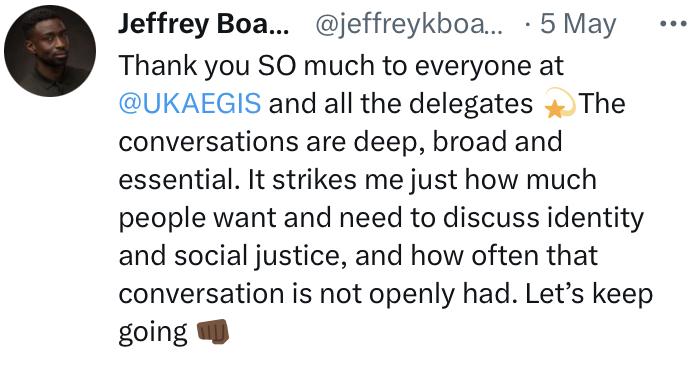



 Photo credit to King’s Bruton
Photo credit to King’s Bruton


It was great to see so many of you at the AEGIS Conference on 4th May, our first in-person event since before the COVID-19 pandemic. The Conference not only gave us an opportunity to reflect on the challenges that guardians and schools have endured during the last few years, but also, importantly, to celebrate the way that we have all worked together, pivoted, and developed our practice to meet the many demands of this ever-evolving sector. Through the trials of the pandemic, and the raft of new government guidance published in recent terms, safeguarding has been clearly identified as the overriding priority in looking after international students, and importantly, as being everyone’s responsibility.
NMS 2022 is now in full operation, and schools have been navigating through the newly formed standards. A further review of the NMS is expected, as touched upon by Michael Bell during his presentation to the AEGIS Conference, and we will need to wait to see what might come next.
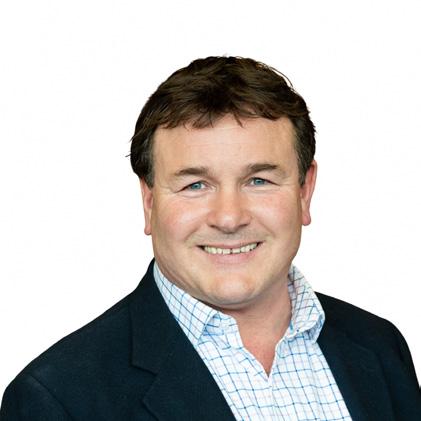
What we do know is that key guidance such as KCSIE and the NMS is written to be vague by design. It is the setting or organisation that should reflect to ensure that they are being compliant. Within AEGIS we are acutely aware of the important and unique role we play. Our independence allows us to take a unique position between all parties; supporting schools and guardians alike as they work together to support international students.
We thank all our members and partners for working with us this year, and we look forward to supporting you all in the terms to come.

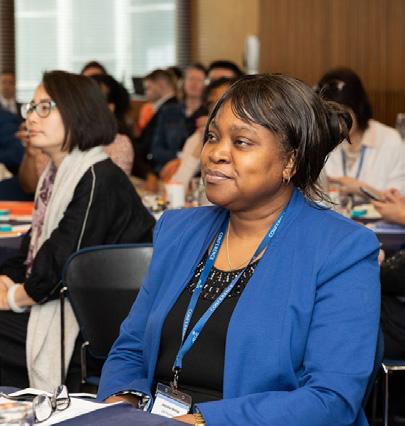
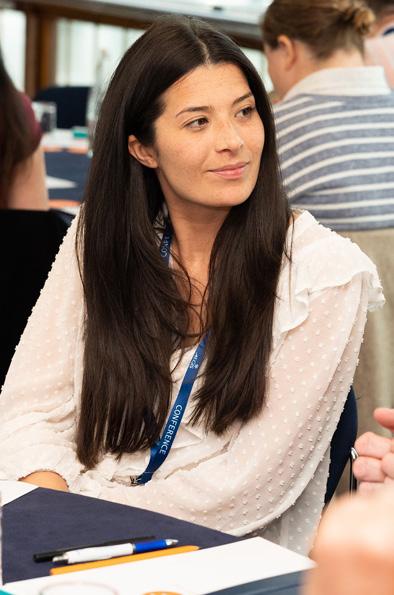


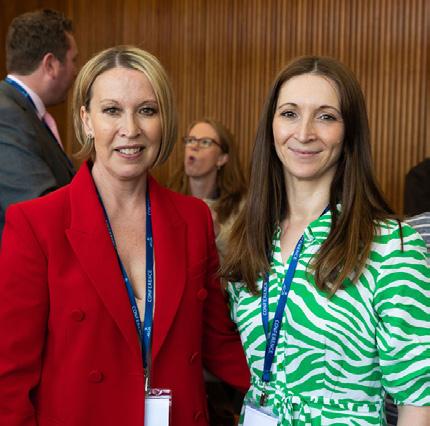

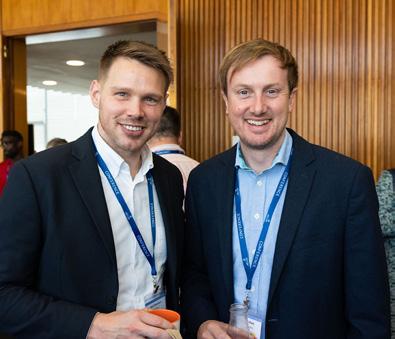
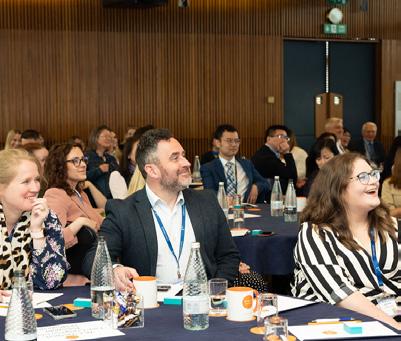

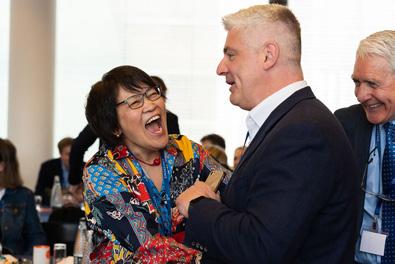


The AEGIS team were delighted to host our first in-person conference since before the pandemic, welcoming a lively mix of guardians, agents, schools, exhibitors, and sector colleagues to the Congress Centre in London.
Our event kept the welfare of international students firmly at its heart, with talks and discussions focusing on key areas of safeguarding and statutory guidance.

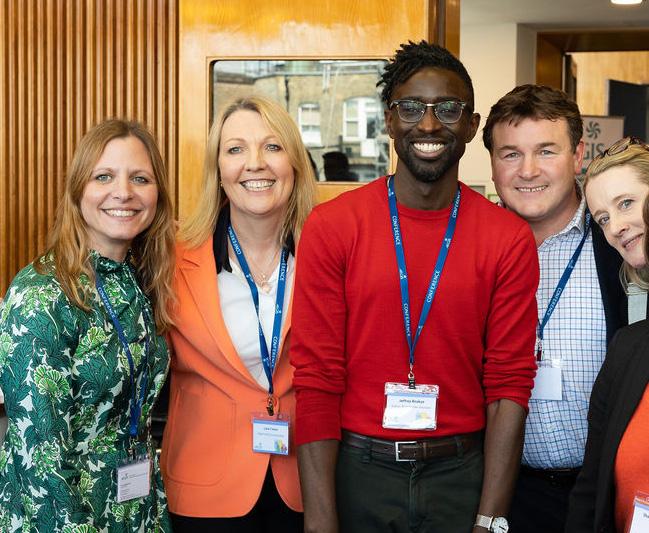
We chose our speakers for their powerful and compelling messages, to give our delegates a unique opportunity to hear new perspectives and inspiring voices. Keynote speaker, Jeffrey Boakye, gave an insightful and galvanising speech on ‘Treating Racism as a Safeguarding Concern’, leaving the room buzzing with enthusiasm and discussion; while Sarah Smith of Breck Foundation delivered a powerful talk on the shocking story of Breck Bednar, and the vital work they are doing to prevent young people from falling victim to predators online. Matthew Knott of StudyTravel gave delegates a timely market update – with an overview of trends in global secondary education.
Michael Bell, Head of Independent Education Unit Territorial and Policy Team Independent Education and School Safeguarding Division at the Department of Education, joined the AEGIS Conference on screen to deliver an overview of the National Minimum Standards for Boarding; touching on the revised document issued last May and discussing the possibility of further development of the NMS in the future. Michael remained with us for our specially assembled ‘Panel 22’, formed to discuss the new standard on Guardianship (Standard 22). Jemma Holroyd of Queen Ethelburga’s Collegiate, Steph Gilbert of Oxbridge Guardians, Val Barnes and Martin Ayres of QEG and our own AEGIS CEO Yasemin Wigglesworth debated the implications of this vital new addition to the NMS from the perspectives of guardians, schools and inspectors, and ultimately, the importance of working together to achieve best practice.
The Conference was opened and closed by our Chair, Adam Lubbock, and hosted by the AEGIS team. Delegates identified the speakers, networking opportunities and the food as particular highlights of the day, and we look forward to bringing the same elements and energy to our next AEGIS Conference, in 2024!
View all the Conference photographs here
Photography by:
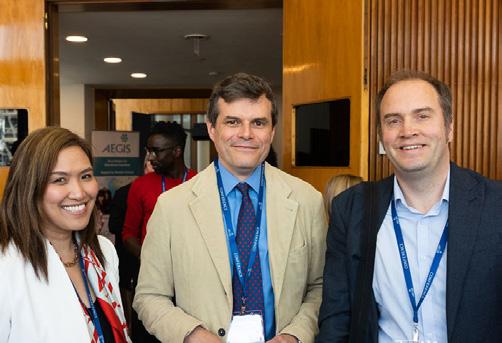
We love working with and supporting our members, and our community is continuing to grow, with nearly 100 AEGIS guardians and 160 member schools.
If you are interested in finding out more about accreditation, please do contact Sharon Sverdloff for more information, via sharon@aegisuk.net. Since our last newsletter we congratulate the following AEGIS members for passing accreditation:

Accreditation
• Robin Education
• The Guardian Family Network
Re-accreditation
• Academic Guardians
• Cambridge Guardian Angels
• Redoor Education Ltd
• Ruyang Guardian Services & Education
Full List of Gold Standard Accredited Guardianship Organisations


Accreditation
• Elena McGraw
• Eltive Safe Hands Guardianship
• Gold Lampstand Education Ltd
• Kew Learning
Re-accreditation
• English Plus Guardianship
• Genesis Education Planning
• YES Guardians Ltd
Full List of Preliminary Accredited Guardianship Organisations
New Member Schools since our Spring newsletter
If you are a school reading this and you are not yet an AEGIS member then please do get in touch with Sophie Lindsay, via sophie@aegisuk.net.
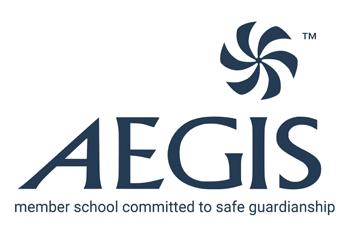
• Aldenham School
• Ardingly College
• Oxford International College, Brighton
• Read School, Drax
• Tettenhall College
• Wellington School
A full list of AEGIS member schools can be found here


We thank all of our new members and accredited organisations for your hard work and support!
We thank all of our new members and accredited organisations for your hard work and support!
AEGIS is lucky to have such dedicated and experienced Trustees and we have recently welcomed several new Trustees from educational guardianship and school backgrounds. We asked what drew them to AEGIS and what they enjoy most about working with international students.
STEPH GILBERT DIRECTOR OF COMPLIANCE & SAFEGUARDING OXBRIDGE GUARDIANSWhat drew me to AEGIS was the work I’d seen AEGIS do since I’ve been in the guardianship industry; ranging from the development of the accreditation process, to the campaigning with DfE and communication with PHE (and other bodies) during the pandemic. It’s clear to me that ours is an industry which requires regulation to ensure best practice and the safety of our students; which is why I wanted to work with AEGIS, not just as a Gold Standard guardianship organisation, but as part of the Trustee team to help further the promotion of excellent standards, and to support the essential work which has been and is already being done.
I have worked with international students since I was a student myself, and I have always enjoyed the unique world of international education and everything which comes with it. I love that by working with international students we’re challenging our ways of thinking to a more global level.

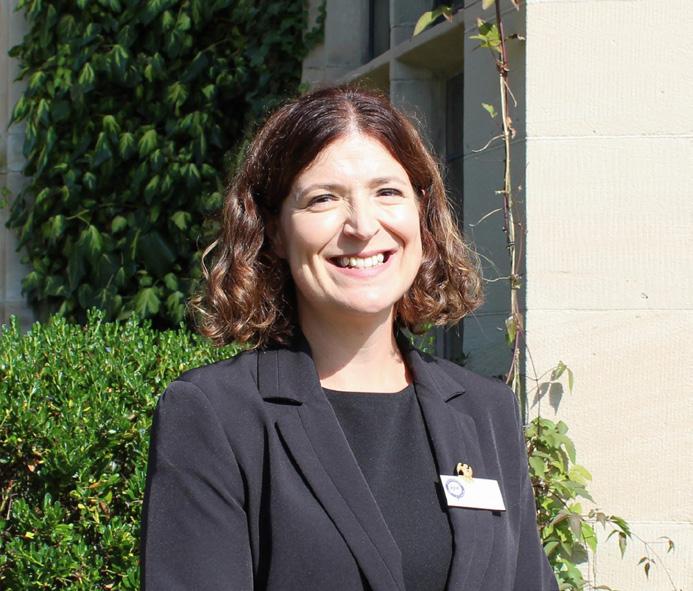
I was drawn to apply to be a Trustee for AEGIS as I believe that for a young person to be successful in their educational career they must first and foremost feel safe and cared for. AEGIS helps to ensure that safeguarding and wellbeing are at the forefront of guardianship provision. I am passionate about promoting and educating young people with regards to positive wellbeing and look forward to working as a Trustee.
I really enjoy working with international students as it allows me to personally learn more about other cultures and beliefs. As a school with a large cohort of international students, part of my role is facilitating opportunities for the students to share the aspects of their culture that matter the most to them.

I have been lucky enough to have spent my whole teaching career in boarding schools, where international students have a hugely positive impact. AEGIS was created to ensure that these remarkable young people are properly cared for and I am honoured to be able to play even a small part in that. I see this as an opportunity to contribute as much as my experience will allow, and also to learn more about such an important cornerstone of our sector.
International students bring so many positives to schools that they join. Aside from the obvious advantages to boarding communities of increasing cultural diversity, these young people bring completely different life experiences, passions, dreams, expectations, talents, and ideas of friendship and family to the mix. They have chosen to leave their friends, families, and home countries because they want to immerse themselves in a completely new culture and community, so they do tend to be extremely outgoing and eager to make friends and become part of the family. As well as bringing their wonderful cultures to the UK, they are fascinated by the one they are joining, and it is an absolute joy to re-experience my own country again and again through their fresh and amazed eyes.
I want to contribute to a worthwhile cause, sharing experiences with colleagues and making international students’ UK experience a positive and memorable one! Working with young people enriches my life. International students bring their culture and heritage to the UK and in turn British education contributes to their growth. Playing an important part in this process and seeing them staying in a safe environment, becoming more confident and realising their potential gives me great pleasure.
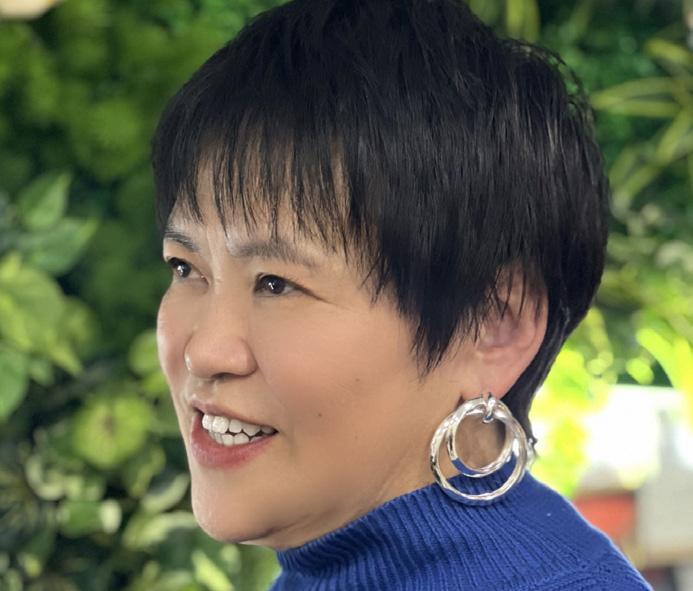
I have been a Senior Housemistress at Clifton College, a Faculty and Department Head in a variety of HMC and GSA schools and have always worked closely with the international community. As a Housemistress, I have kept in touch with many of my overseas pupils and even attended some weddings! More recently, as a director of a guardianship company, I have worked closely with schools to ensure the safety and wellbeing of those pupils in our care. This is at the heart of all we in the education and guardianship community do and AEGIS supports this wholeheartedly.
I have seen how AEGIS work to support the pupils who come to our schools to live and work and the high standards they aspire all their guardianships to uphold. I believe this is vital to keep pupils safe, well protected and supported and I am absolutely delighted and feel very privileged to be given this opportunity to continue to support the international community as it is an area of education that I hold very dear to my heart.

 Adam Lubbock Chair and Vice Chair
Lana Foster AEGIS Conference 23
Adam Lubbock Chair and Vice Chair
Lana Foster AEGIS Conference 23
UK boarding schools should lead the way and free their pupils from their grip
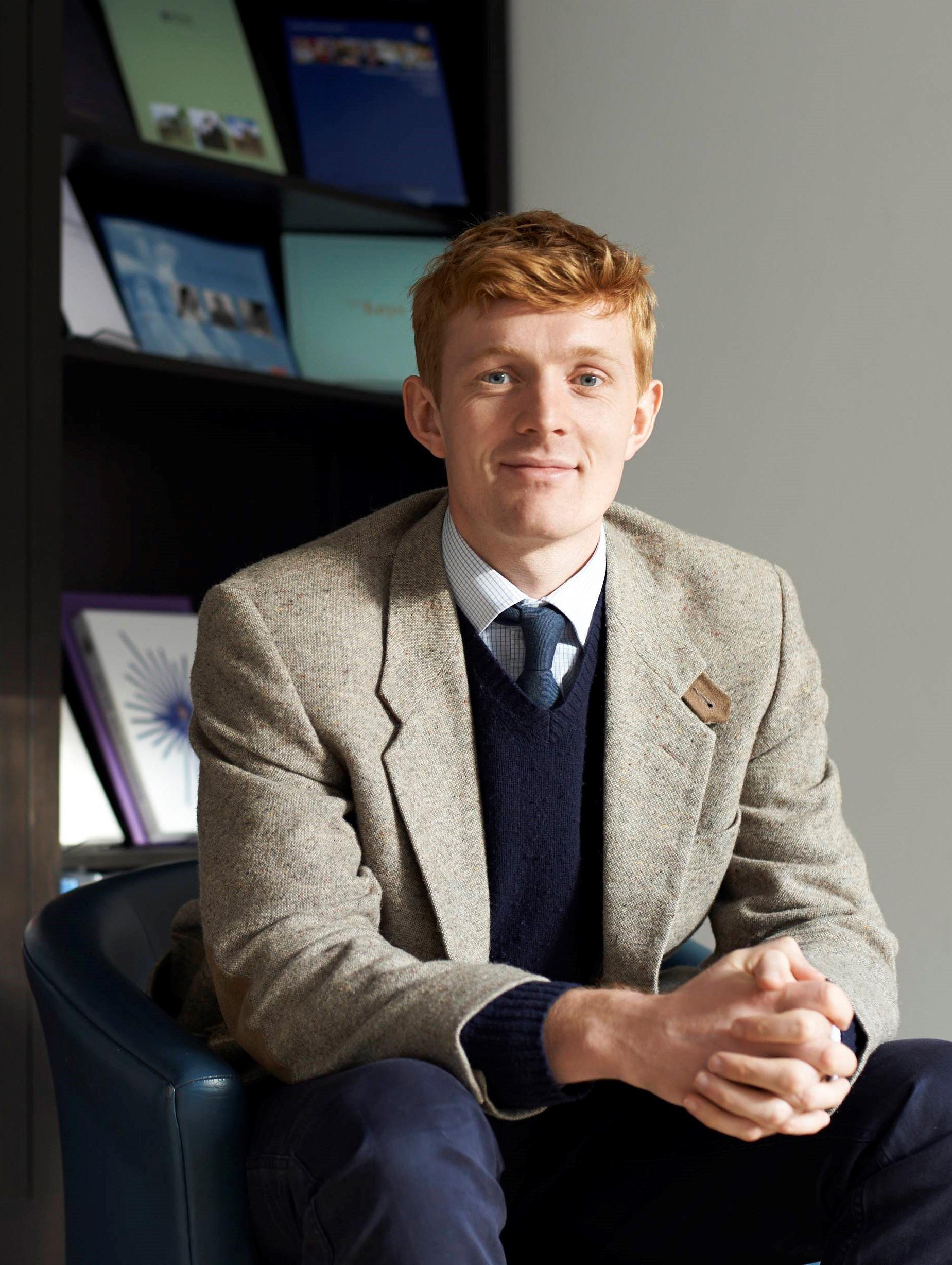
I recently attended a conference on AI in Education. A perplexing mix of breathless excitement and existential doom, it featured speaker after speaker eager to tell the audience just how ‘radical’ and ‘disruptive’ this new digital revolution was set to be.
The headline speaker, a distinguished headteacher and writer on the subject of AI, took us through slides that depicted a future vision of schooling he saw as inevitable. The traditional classroom and school library were out, condemned as ‘20th Century’; instead, children were depicted sitting in front of screens that tracked their eyes and wearing headsets that monitored their brain activity, both of which served up a ‘personalised’ education informed by data in the same way that Spotify serves up playlists.
The conference was held in a centuries-old building adorned with beautiful handiwork and the school, set within many acres of woodland, radiated a positive, humane sense of tradition. And yet not one speaker felt confident in saying what was so obvious: that the vision that Big Tech has for our schools represents a profound debasement, and that we should therefore resist it with all the powers at our disposal.
The related question of smartphones in schools strikes me as a similar problem. On the basis of common-sense, let alone aesthetics, the sight of teenagers hunched over their smartphone must surely strike many school leaders as self-evidently a diminishment from the typical school’s culture of only half a generation ago.
As smartphones began to tighten their grip on the nation’s youth from 2012, it was understandable that educators might have deemed them a harmless social lubricant or seen in them an answer to the perennial problem of student engagement. Such an assessment is alas no longer possible. Attention deficit, instant gratification, addiction, dependency, anxiety, depression, loneliness, not to mention sexualisation and sexual exploitation, have all been strongly correlated to teenage smartphone use. The work of Jonathan Haidt and Jean Twenge has catalogued the same. Our optimism – or naivety – of the early noughties must be updated to a sober coming-toterms with how destructive these devices are.
With successive UK governments giving so little support to families and schools on this question (in contrast to countries like France) the issue of smartphones is a great opportunity for UK independent schools, especially UK boarding schools, to establish a united front and offer parents and children smartphone-free environments. For the many parents concerned about this issue but unwilling or unable to be the only ones to make a stand, the positive peer group effects of a boarding school commitment to limit smartphones – at the very least to
under 16’s – is a unique gift.
It will be said that boarding school pupils are those that require smartphone most for communicating with distant relatives and for organising travel arrangements. Plenty of non-smart phones (e.g. the LightPhone or Boring Phone) work just as well. Likewise will some argue that wily teenagers will hand in ‘burner phones’ instead – surely an indication, if one were needed, of the unhealthy levels of teenage addiction and nothing that an experienced boarding school pastoral team, used to stamping out other pathologies, would not be capable of dealing with. It is not too late.
The horse has not bolted. Boarding schools should think less about ‘banning’ these devices so much as ‘freeing’ their pupils from their grip and creating positive cultures that ‘rally the really human things.’
To end with a quote from one of the best writers on this topic, L M Sarcasas,
“We should recognize that with all the talk of automated labour and outsourced intelligence we are being distracted from the one element of most profound human consequence—care. Care is what creates the possibility of purposeful action. Care is what issues forth in meaningful knowledge of the world and others. Care is ultimately what transforms the quality of our involvement and engagement with the world so that we pass from “getting things done” to living.”
Will Orr-Ewing is the Founder of Keystone Tutors and a Director of Concept Education. You can follow or connect with him on LinkedIN here.

Owner, No Fluff Sales Consultancy for Education

I have not yet met an Admissions Officer, Bursar, Registrar or Guardianship Organisation Owner who says they’re ‘in sales’. It just doesn’t sit well in an education context. We are not about to arm-twist a parent into sending their child to us simply to hit a target. That would be morally wrong. So we are not talking about sales in the ‘Wolf of Wall Street’ sense. No double glazing calls. No at-any-cost time share sales tactics. But, at the end of the day, we are businesses - we need fees in to pay our bills (and more so at the moment as we watch the bills rise!).
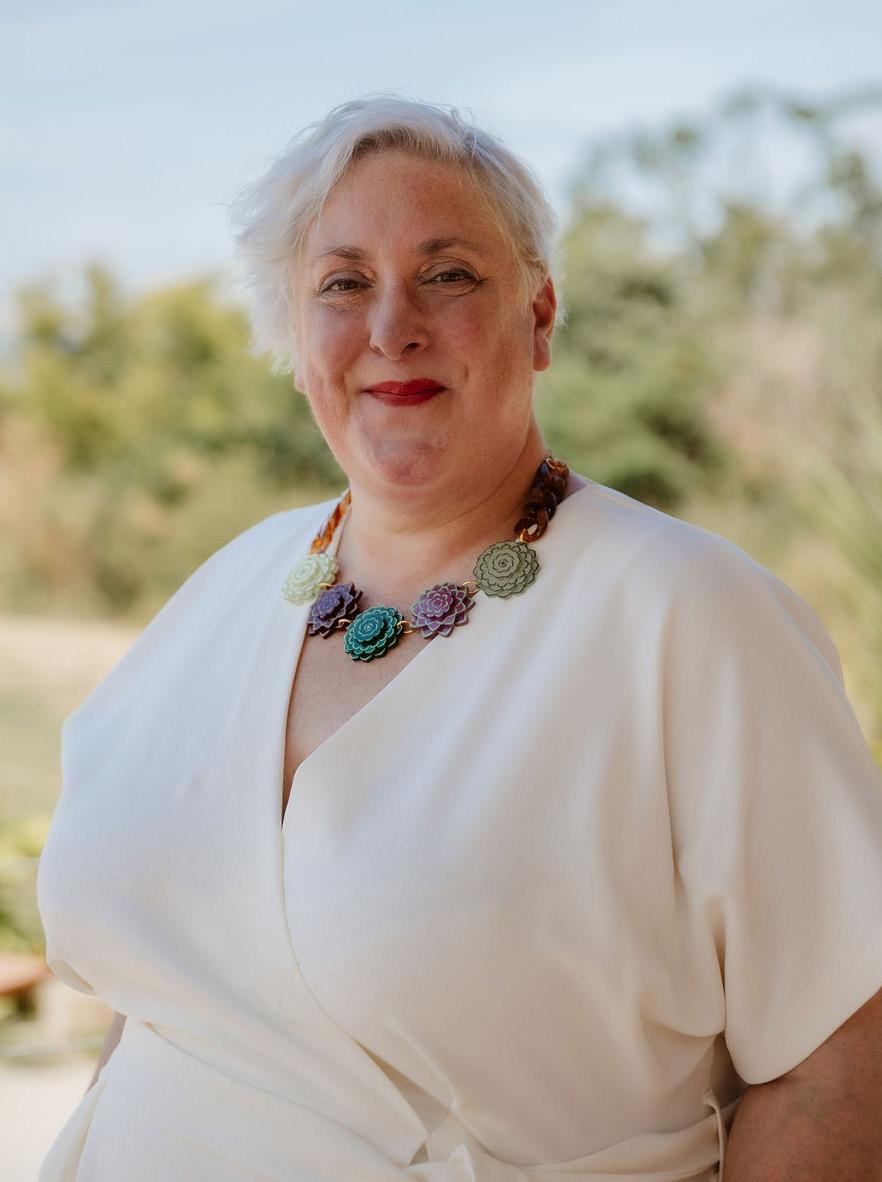
So how about we start thinking about ‘sales’ as easing the path for a parent or student enquirer, that has a good fit with our school or service, into an enrolment. That’s all sales is. Helping those that need our service, buy our service, assuming it’s a good fit for them. It is a fair exchange of value for value.
Now that we have settled into this definition of ‘sales’ in our own context, let’s look at how we can improve. Not just enrol more students but make it easier, too. In today’s world we are post-pandemic, facing increased costs, a threat of VAT being added to school fees and competition for our internationals by campuses more local to them.
Now is perhaps, then, the time to tighten up our processes and be more proactive in turning enquiries into enrolments. And I will repeat here, we are easing the path for a student with a good fit for our service to benefit from what we have to offer.
I see, in 99% of the schools and organisations I help, ‘sales’ being left on the table and the main reason is the mindset of our Admissions staff, business development officers or indeed guardianship organisation owners themselves.
Let’s look at what is usually happening.
1. We wait for enquiries to come in via the website, agents or open day visitors.
2. So, the enquiry comes in - let’s say its from a parent.
3. You reply (often this can be after several days ifyou’re busy)
4. In your reply you give them plenty of information, pdf attachments, booking forms, maybe a link to a fabulous video.
5. They don’t respond (some do respond, but I think you’re probably managing well with those leads so I’m focusing on those that don’t).
6. You may consider chasing them up, but probably won’t, thinking if they were interested they’d have replied. And you have tons of other things to get on with.
7. Maybe a few weeks later, you may decide to try again, just in case the email got lost.
8. You send them your original reply with some words along the lines of ‘did you get my last email and do you have any questions’.
9. No reply. Ghosted.
10. That’s where it ends - you conclude that your school/service wasn’t right for them.
This is what 73% of you and your fellow schools/ GOs are doing. So you’re not alone! But … you’re not converting enough leads, either.
Did I lose a few of you there, talking about conversions..? Usually that’s where I see crossed arms and eyes shifting to pads and phones...
Following up more than once or twice is awkward, pushy. But you are thinking about YOURSELF here. YOU don’t want to follow up. It’s awkward. You might be interrupting. YOU don’t want to call them. They’re not expecting you. They might be in the middle of something.
I’m afraid I have bad news for you. The process of converting a parent/student or agent into an enrolment takes 5-8 touchpoints.
And more bad news. The process isn’t about YOU.
You are merely the counsellor helping a parent/ student/agent through the process of choosing the right school or service. It’s not YOUR education. It’s not YOUR money they’d be spending. It’s not about how YOU feel. It’s about what THEY need. How THEY feel.
So please, take the focus off how YOU feel about following up, calling or reaching out to that enquirer for the third or fourth time.
Remember they need multiple touchpoints before they trust you and want to buy from you or attend your school. Some will enrol after just a quick conversation. Others need more time, and if your competitors are following up more consistently and effectively, well - they’re simply more likely to have the enrolment.
One of the most effective ways of increasing enrolments from your hard-won enquiries, is to build a robust, and easy-to-implement follow up matrix. One that fits in with your workload, is almost on autopilot, but puts the enquirer at the forefront. One that makes them feel understood, that gives them value at each turn, that establishes you as their trusted advisor on this part of their journey.
They have trusted you by asking about your school or organisation. Now it’s your turn to help them on their journey. It’s up to YOU to help THEM. Especially if you want to pay the bills, but more so if you want every child you can help, find their way to you.
Your two take aways from this piece:
1. Sales is simply a way to find and guide the rightfit students towards your service.
2. Following up on enquiries is not about how YOU feel, it’s about what THEY need to feel and hear and learn to make the right choices.
Petro is a bright, intelligent 12-year-old. He had never been to the UK and never expressed any interest to attend school outside of Ukraine. He had been attending one of the more prestigious schools in Kyiv. He and the family admitted that due to missile attacks, they felt he needed to go somewhere his education could proceed out of danger.
Quickly we had Petro tested for English levels, and admission to British schools. He did very well on his exams, I prepared him for his interviews with the schools, and two schools interviewed him with both extending offers to begin in January 2023.
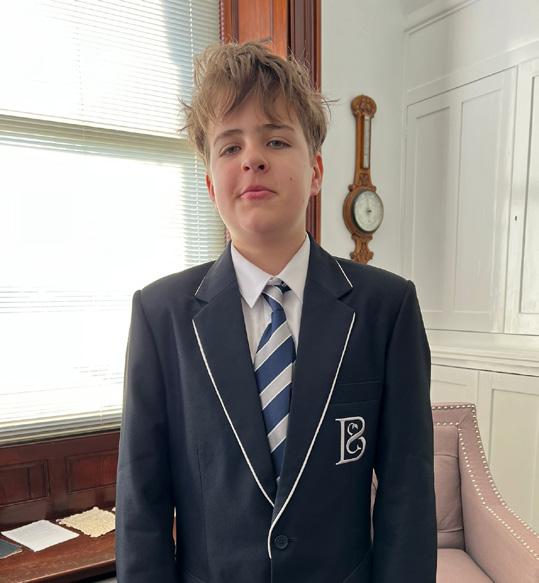
Naturally, he immediately applied for a visa to attend school in the UK. With holidays in December and January, he did not receive permission to enter the UK until 16th of January.
During this waiting period, I remained in contact with the school, Petro, and his parents, keeping everyone up to date on where things were at present. As guardian, I made an introduction of the school rules, expectations from the boarding students in the UK, the rules in regard to living accommodations, and unique aspects of British culture. I helped to choose and sign up for school activities. Family and I were present at the parents’ evening before Petro arrived. I was translating, to familiarise him with the teachers and their requirements and relieve the whole family`s stress.
When Petro arrived he went directly to the school where he very quickly integrated, began friendships, and caught up on all his lessons. After one month of studying, I visited Petro and met with his houseparent and tutor, and prepared the report for his parents after these meetings.
He is enjoying the British educational experience and is succeeding beyond expectations for such a tardy start. His parents are thrilled and grateful for all of the cooperative coordinated efforts in support of their son.

“I am happy as a guardian to help Petro and his family.”
MARYNA JENKINS, DIRECTOR, JENKINS ENTERPRISESIn December 2022 I was contacted by a family about attending British schools starting in January 2023. They admitted they had never contemplated British education until recently.
We don’t discourage students from going to stay with school friends or relatives in the UK and want to spend holidays with them. These arrangements can work really well and make for a more enjoyable break and can save overseas parents money.
However, experience has taught us that not all family friends and arrangements made by students are what they seem. Sometimes the adult taking responsibility for the student doesn’t really understand the responsibilities they are taking on. In other cases, they may not be who they say they are. Furthermore, following the release of the new National Minimum Standards for Boarding, Schools have new responsibilities when it comes to overseeing all educational guardianship arrangements.
If students choose not to stay with a Bright World host family then they need to know what the rules are.
• We do not allow students to stay in University or college residences under any circumstances.
• We do not allow students to stay in hotels unless supervised and accompanied by an adult of 25 or over.
• We do not allow students to stay with anyone who does not agree to supervise the child and who is not 25 years old or over.
• We need to see the Photo ID of the supervising adult who will be looking after the child.
• We need to receive an Accommodation and Permission form from parents authorising the stay.
We then have an online, mobile-friendly feedback form that we send to students after they have stayed with a family friend or school friend. Just because we are not making the arrangement ourselves we still have duty of care to make sure the students have been happy.
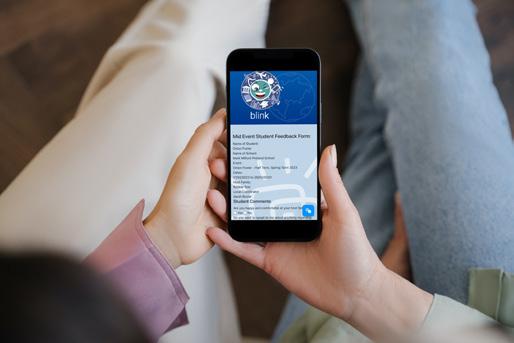
“Making such checks on family friends may seem intrusive and unnecessary to some parents. However, I make no apology for asking these questions to ensure our students are safe. Our ID checks have, in the past, revealed that arrangements were far from appropriate, so it is well worth checking.”
LANA FOSTER, MANAGING DIRECTOR
When students ask to stay with friends and family during the holidays, it is very important that as guardians, we check that the proposed arrangements are safe and appropriate.
UK2Learn caught up with one of their alumni students Virginia, who is now studying Astrophysics at the University of York.
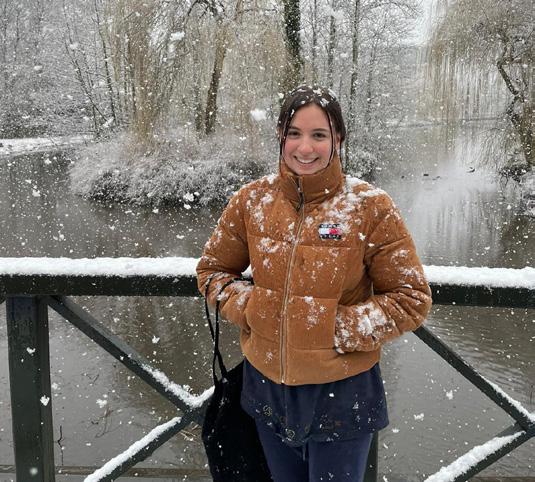
Before pursuing her degree in Astrophysics, Virginia was studying at Charterhouse in Godalming. Virginia recalls the times she would stay with her guardian during revision season and she spoke about how her guardian always made her feel at home and this helped greatly.

When completing her IB exams, Virginia decided she wanted to pursue a degree in Astrophysics. When asked what inspired her she said:
“Having a deeper knowledge of how our universe works was always in the back of my mind. I knew I wanted to study Physics with Astrophysics when I was head of the Astronomy society during my IB studies, which made me even more interested in how the astrophysical technology works.”
She continued to talk about her future plans:
“I will finish my degree and perhaps I will pursue a doctoral degree where I would like to analyse data from the JWST (James Webb Space Telescope).”
Virginia then shared some advice for other international students:
“Study something that interests you and not because other people told you to do. Something which has helped me a lot when there were academically stressful times, is always remind yourself of your aim, and you will get there.”
When asked to describe her experience with UK2Learn in 3 words she said:
“Fun, present, family.”


Every year, JD Consultancy regularly organises webinars with UK independent schools and relevant organisations.
In the latest summer webinar on 19th May, JD Consultancy were delighted welcome Yasemin, the CEO of AEGIS, who we asked to share the latest updates on safeguarding and guardianship, with a specific focus on the changes since the introduction of the revised National Minimum Standards. Other guests included the directors of admissions from Rugby School, Haileybury School, and Mayfield School for Girls, to present details of their excellent academic performances and pastoral care to the audience families.
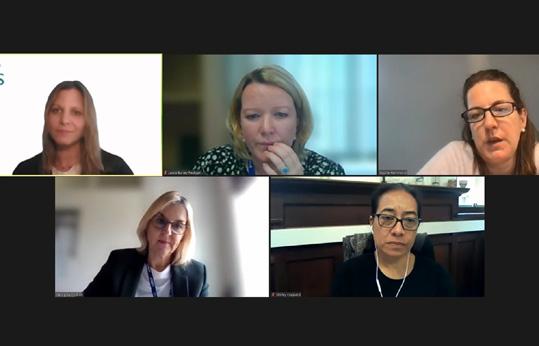
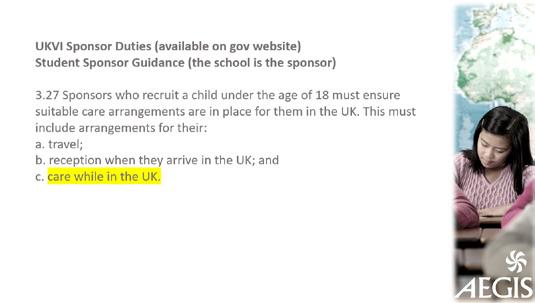
From many years of experience working with international students and UK boarding schools via guardianship and school placement services, JD Consultancy clearly knows that good education is not just about excellent academic performance, but that the care put in place for children when they are not in the classroom is just as important as that. This webinar of JD Consultancy, therefore, provided a platform from which to help Chinese families to learn about their target schools from different angles, raising important awareness of the physical and mental well-being of overseas students.
During this webinar, it was great to hear from the school delegates that there is now great focus on the mental health of international students: Both Haileybury and Mayfield now have designated well-being centres and Rugby has all its housemasters trained to a DSL level to raise awareness of student well-being. AEGIS has also amended its requirement of member guardians in order to add more emphasis on students’ care and communication. At JD Consultancy, there are also four senior members of staff trained at the DSL level.
Mrs. Collicutt from Haileybury School mentioned in her presentation that
“The bedrock to our education is the pastoral care… The wellbeing and welfare of students are also at the very heart of every member of JD Consultancy.”

Host families are chosen for their exceptional skills, diverse interests, and unwavering commitment to creating a safe and supportive environment. They possess a deep understanding of the British education system and foster cultural exchange and global awareness.
Take Tim, an international student boarding in the UK, as an example. Tim has found an incredible home with his host family, Adeline, CheeWee and their two teenage sons. From the moment Tim arrived, the family welcomed him with open arms, treating him like a cherished member of their family. They involve Tim in their church activities, volunteering efforts, and family outings, ensuring he feels included in their daily lives. Tim eagerly spends leave weekends and holidays with the family, joining them for pipe band practice, shopping trips, and visits with friends and family. Adeline and CheeWee go above and beyond, supporting Tim’s aspirations by accompanying him to University Open Days, helping him secure opportunities in orchestras, and sharing volunteering prospects with Academic Families and Tim’s parents. Their cooking also ensures Tim enjoys a taste of home!
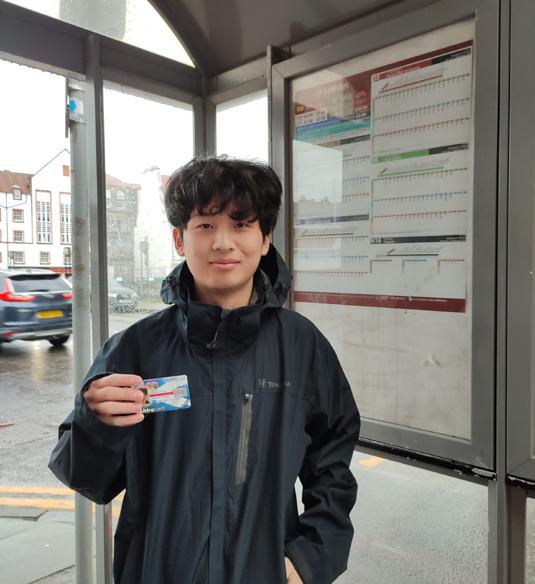
As a musical family, they engage in regular music practice, with Tim attending their children’s orchestra performances in stunning concert halls, fuelling his love for music. Adeline has also assisted Tim in obtaining a regional youth discount card, granting him benefits like free bus travel until he turns 22. They celebrate Chinese New Year together, incorporating meaningful volunteering activities into the festivities.
Beyond their home, they embark on exciting excursions, from outdoor parkour to special exhibitions like the Van Gogh showcase. Tim has even joined the family’s children at youth club, forging lasting friendships and creating memorable experiences.
“The bond between Tim and his host family exemplifies the remarkable connections that can develop between international students and host families. These relationships create a supportive and loving environment that profoundly enriches the educational journey for students like Tim.”
Academic Families has been accredited to AEGIS Gold since 2016 and we pride ourselves on our network of carefully selected host families spanning the country, who ensure we provide a nurturing and enriching home away from home for our students.
LORNA CLAYTON, MANAGING DIRECTOR
At Ratcliffe, we are proud to offer a safe and enriching environment where all students can develop their English and have a unique opportunity to be part of our nurturing Boarding school community. This Spring, we were delighted to welcome 12 Thai students to Ratcliffe for an enriched and academic Immersion Programme. The Ratcliffe experience did not disappoint, with the students fully immersing themselves into every opportunity available to them.
Throughout the four weeks with us, students took part in all aspects of school life and British culture, following academic lessons with their year group, attending several weekly excursions across the UK, taking part in Boarding social events, trying out new sports and making the most of all our co-curricular activities on offer during the school term. As well as academic and English language development, our short-stay Immersion Programme helps students’ to gain valuable life experience, and for many international students, our short-stay Immersion Programme ultimately is the first step to transitioning to fulltime study with us.
Here is what our international students had to say about their Immersion experience with us:

“We received a very warm welcome from everyone at Ratcliffe. It’s truly beyond expectation. We were so very happy and impressed with everything.”
“Thank you for the last 4 weeks at Ratcliffe College. I have improved myself in so many ways, such as my English skills, organisation, interaction with people, and much more! These 4 weeks are one of the best memories that I will not forget. It meant a lot to me. There are some activities that I have never done before and really enjoyed - I now like golf, bowling, pool, playing Chinese cards, tennis and rounders. An unforgettable 4 weeks of my life!”
“When I first arrived at Ratcliffe College, I thought the school looked like a castle. It looked historic and fabulous. I really enjoy the activities here and playing games in the Boarders lounge too. The staff and students are lovely and have encouraged me to get involved in many co-curricular activities. Thank you to all the staff and students who have interacted with us and have been very welcoming.”
Ratcliffe College welcomes international students to join us for our short-stay Immersion Programmes.

Please contact Mrs Sophie Noctor (Boarding Recruitment Manager) at snoctor@ratcliffecollege.com for more information.
Visit our website. here.

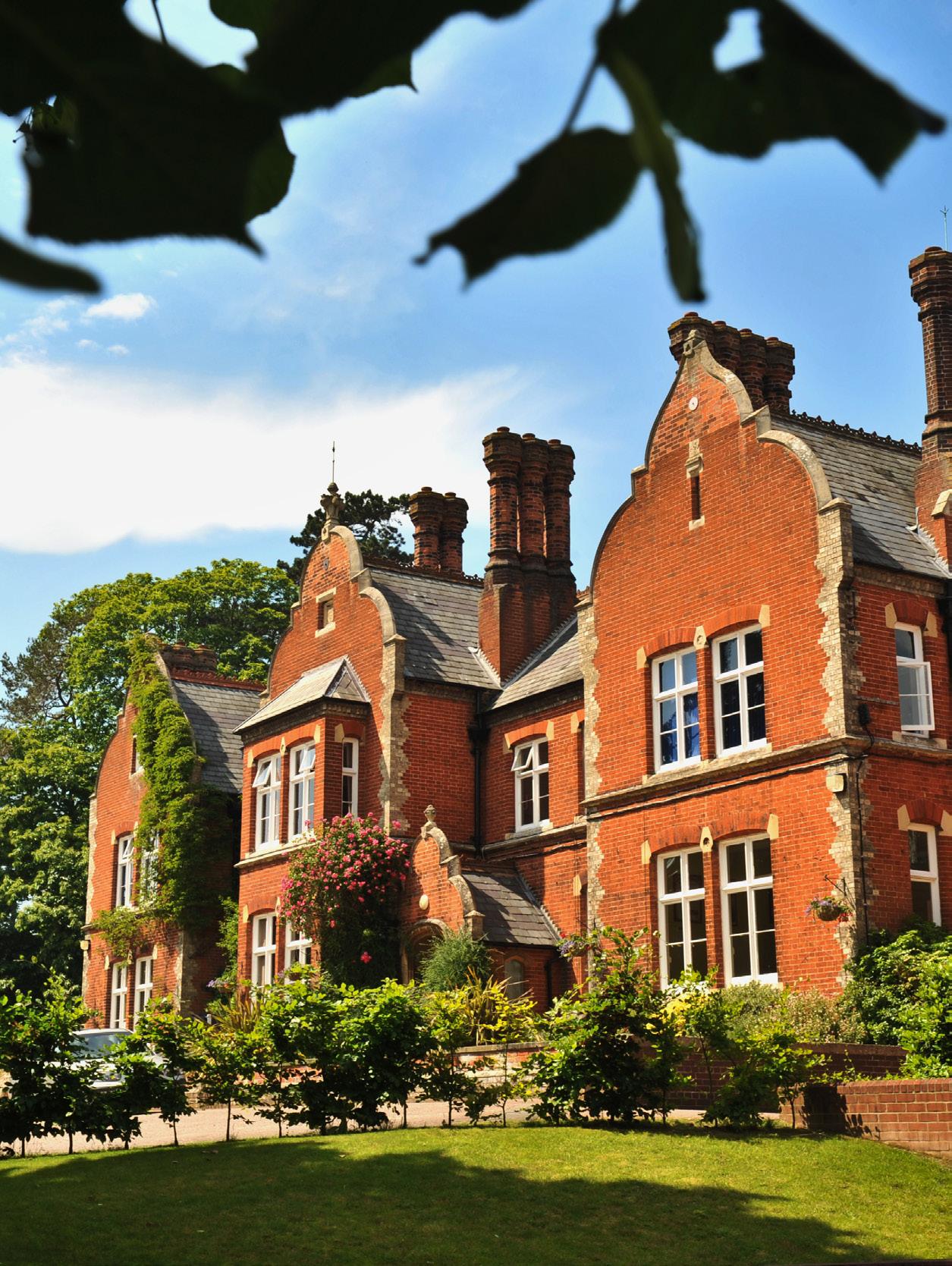 Photo credit to Woodbridge School
Photo credit to Woodbridge School

King’s Bruton’s international pupils enjoyed a cultural trip to Wells. This article was written by Anna from the 4th Form and in Arion House. She comes from Spain.
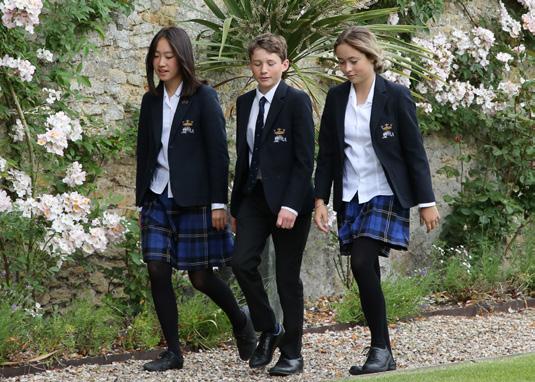
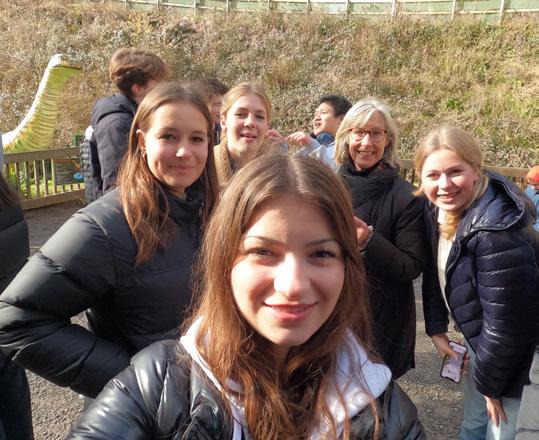
The international pupils were offered a cultural trip out of school. The day started with a very interesting tour around the Wookey Hole Caves, a beautiful place with a fascinating story behind it. We had an amazing experience inside as we didn’t expect such beautiful caves from the outside.
The pupils were impressed with all the history and legends about those caves and took lots of delightful pictures of the stalagmites. One of these stalagmites was millions of years old! We learnt that the caves have been used by humans for 45,000 years. It wasn’t just a simple tour, as we also experienced an exciting 4D cinema show and had a go at some paper making, as they used to do it 400 years ago.
After that pleasing visit, we went to Wells, an appealing small city in the South West of England. It is called a city because it has a Cathedral. That’s exactly what we visited, the amazing Cathedral of Wells. King’s Bruton thinks that it is very important that the international pupils learn about the culture of this country and have an opportunity to visit charming places like that. We had a tour guide inside the Cathedral and had some time to appreciate the beauty of that piece of architecture and the amazing astronomical clock - the oldest in Europe. It was an excellent day out discovering the area. We used the school GoPro and filmed our day out.
You can watch our video here.
“Our education policy is to ensure international pupils are engaged in every area of school life with an aim to encourage individuality, dynamism and confidence, and the ability to collaborate and build mutually beneficial relationships.”
NICOLA CHECKETTS – HEAD OF EAL
Konstantin attended an international school in his native Moscow until Year 8. He came to England when he was 13 years old to join Tonbridge as a boarder, and his family now live in the UK as well. Now a member of the Upper Sixth, Konstantin looks back upon his five years and picks out some highlights.

How would you sum it all up?
Being far away from home I initially feared being homesick, but Tonbridge never left me with that option. I was constantly involved in all sorts of activities, from Spanish drama to chess. This meant that I did not look back too much because there was just so much to try.
However, I could never have imagined that I would fall in love with the School in the way that I have. I have found a second home here: what I mean by ‘second home’ is that I am able to pursue whatever interests me and I have lots of support, just like I would back in Moscow.
What have been your stand-out moments?
The best moment has definitely been winning the English Schools Spanish Debating Competition. This was a reflection on our amazing Modern Languages Department and an experience I will never forget.
Something else I will cherish is being part of the Football 1st XI: we won the league and then the ISFA Trophy. Throughout the season, what stood out was the professionalism of the whole set-up surrounding the first team.
What will you miss most?
Spending evenings in the company of my closest friends in my boarding house, and the time we have with tutors in the coffee room.
What have you chosen to study after Tonbridge?
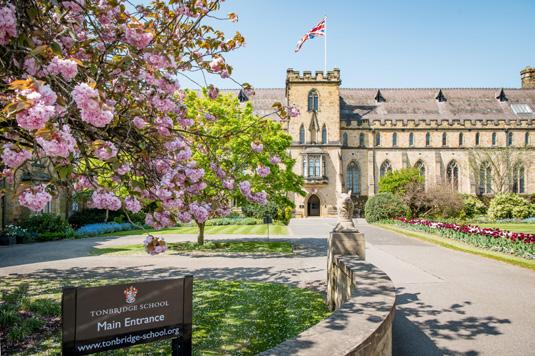
Spanish and Philosophy at UCL (University College London) and so I am not moving far away!
What has Tonbridge taught you?
To have an open mind in everything I do. Trying new things is part of the Tonbridge experience. It has also taught me the importance of building good relationships with fellow students, teachers and other staff – something that will be crucial at university and in the working world.



Yan and Kerim, in the Lower Sixth Form at Sherborne School, are developing interests that will shape their future careers. As well as being a keen tennis player, Kerim has a passion for politics, and leapt at the chance to be involved in the UK Youth Parliament:

“My dream is to work as a diplomat in the Bureau of European and Asian Affairs. Through my involvement with the UK Youth Parliament, I have actively participated in the democratic process, representing the interests of students and making a positive impact within the school community. We have regular meetings with other schools and the local council, and work on issues such as helping young people to become independent by developing cooking skills and learning to budget. In my experience, Sherborne School offers students an array of exciting opportunities to engage in diverse activities and thrive academically and personally.”
Yan’s favourite subject is Computer Science, and he hopes to become a tech-entrepreneur in the future. Thanks to his participation in Sherborne Robotics Club, he was invited to enter the Student Robotics Competition:
“We needed to design and build a robot that could collect boxes in the arena by itself, without using a remote control. Our team won 5th place in this national competition, also winning “Best Rookie Award”. I have a very competitive nature, recently coming 12th in the All-Ukrainian Mountain-biking Championship, as well as earning certificates for national competitions in Maths and Physics in the UK.
I even entered a Public Speaking Competition organised by our sister school, Sherborne Girls, and was awarded first prize for my presentation on the topic of ‘Healthy Eating’. What I love about Sherborne School is that interacting with peers from different backgrounds broadens my worldview and enhances my ability to adapt to an increasingly interconnected world.”
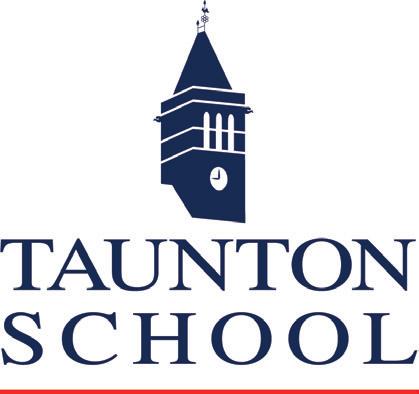
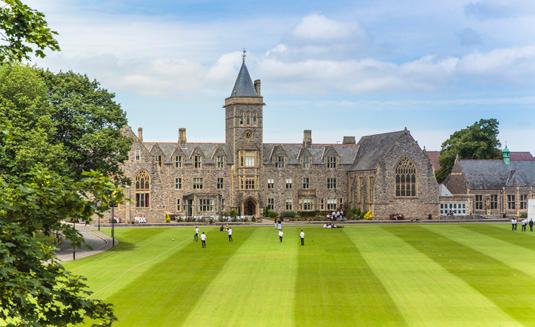
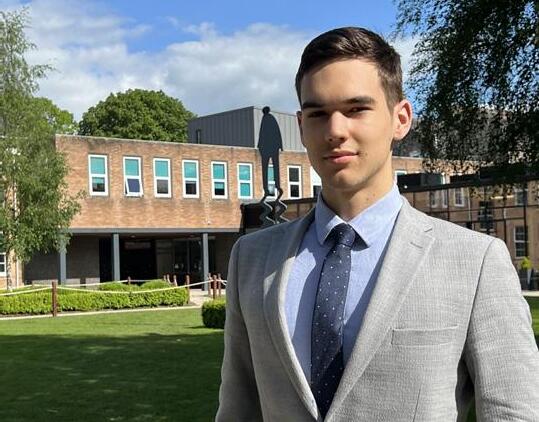
Year 12 student Simon independently signed up senior university lecturers to take part in his own ‘Simply, Infinities’ conference on May 24th.
Oxford University Professors Dominic Joyce and John Ockendon were joined by Dr Davoud Cheraghi from Imperial College London and Prof Mary Rees from Liverpool University to speak about a host of mathematically challenging topics.
Simon, who is studying A level Maths, Further Maths, Economics and Computer Science, said: “We want to show the beauty and depth of maths topics that are not in the school curriculum. “Our goal is to encourage students to start thinking of maths not as just a school subject but as a new potential hobby.”
Topics covered included ‘Limits, Continuity and Differentiability’, ‘Uncountability, Continuum hypothesis’ and ‘Viscosity’. Seventeen-year-old Simon, who hopes to attend a top UK university after completing his A levels and to become a software engineer, acted as the conference host and spoke on the subject of cardinal maths.
Maths teacher/Head of department David Baker: said: “Simon has set up this conference entirely on his own. It’s down to his initiative that he contacted the academics himself – and they agreed to take part.
“This was a wonderful opportunity for anyone who wants to open their mind to all the beautiful possibilities of a more advanced approach to mathematics beyond the school classroom and the textbook.”

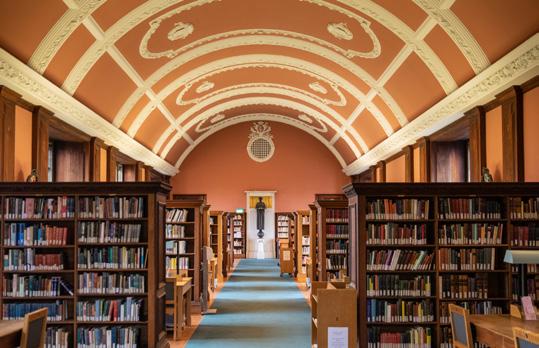
Through the Online Research Programme Elif was able to explore her passion for chemistry. By focusing on drug chemistry and the biosynthesis of chemicals, Elif deepened her understanding of the subject matter while honing her research skills. In an interview with Immerse, she stated, “I didn’t know that the chemistry of drugs would be an area that I would pursue, but when I started the course it became more clear that I should definitely go for it.” One of the key skills Elif gained from the Immerse programme was the development of academic writing skills. The course equipped her with the necessary tools to craft research papers and develop a relevant literature review.
Additionally, the programme provided guidance on formatting reports, preparing her for the demands of university-level studies. Elif’s experience with Immerse Education proved invaluable during her university application process. She was able to showcase her newfound subject knowledge and academic writing skills in her personal statement, which was invaluable in her application.

Elif remarked, “The programme gave me a lot of beneficial information to show in my personal statement, and even though I carried out other extracurricular activities, this experience helped me the most.” Furthermore, Immerse Education’s programme helped Elif articulate her growing appreciation for chemistry during her university interview. Through her participation in the course, she was able to express her enthusiasm and insights more effectively, solidifying her suitability for her chosen course and aligning with Oxford’s academic style.
Elif’s success story highlights the transformative impact of Immerse Education’s Online Research Programme on students’ university applications. By providing an avenue to deepen subject knowledge, cultivate research skills, and enhance academic writing, Immerse Education empowers students like Elif to stand out among their peers and secure coveted places at world-learning universities.
Elif, a passionate chemistry enthusiast, found tremendous support from Immerse Education’s Online Research Programme, ultimately enhancing her experiences and skills to secure a place at the University of Oxford. Elif’s journey demonstrates the value that Immerse Education brings to students’ academic pursuits.
Well done to two of our international boarders, Kaidong and Samuel, who were awarded silver certificates following the most recent Chemistry Olympiad.
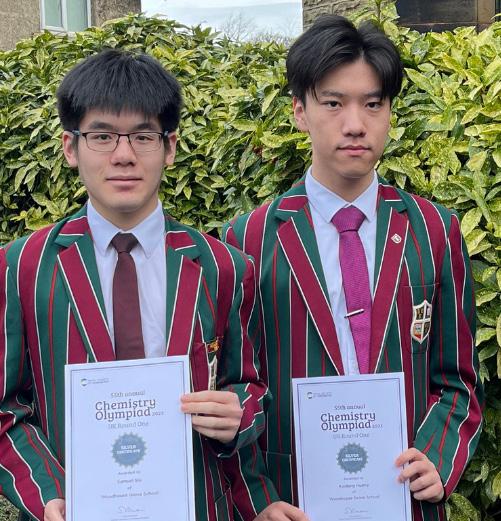
Grovians of all ages celebrated the Coronation of King Charles III and watched the ceremony with pride as Old Grovian, General the Lord Houghton of Richmond, carried part of His Majesty’s Regalia to the altar at Westminster Abbey.
Lord Houghton, who was Chief of the Defence Staff from 2013 to 2016, bore the Sword of Temporal Justice, and we believe this to be the first time a Grovian has been involved in any Coronation ceremony.

Our international boarders from more than 11 different countries, including the United States, Columbia, Saudi Arabia, India and China, as well as mainland Europe decorated their boarding houses and watched the ceremony together.
They were delighted that an Old Grovian was playing such a key role in the ceremony. Other highlights were the precision required for almost 4,000 military personnel to march at the same time in the procession and, of course, the gold carriage! We were honoured to welcome Lord Houghton to speak to pupils at our Prize Day in 2009 and watched proudly as he took his place in history on this momentous occasion.
At Woodhouse Grove, our forward-thinking sixth form offers a choice of pathways so students can tailor their learning based on their personal strengths and passions. Alongside A-levels, students can gain up to 60 days of work experience in one of our partner businesses. Find out more at Top School Sixth Form | Unique Pathway Programme | Woodhouse Grove

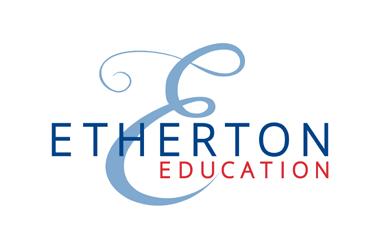
We teach ten academic subjects in our pre-sessional summer schools, but the only subject that we make compulsory for everyone – apart from English language – is Drama. Many students hate it at first. ‘Why do I have to do Drama, Sir? It’s a waste of time. I want to do more science!’ But we persuade them to stick with it, and by the end of the summer they get the point. On our final feedback questionnaire, 95% approve of it.
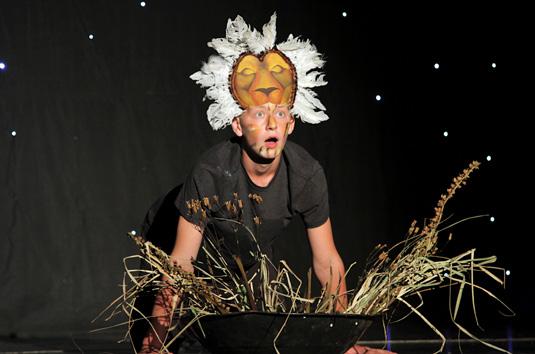
Drama lessons build confidence. Here’s Thomas, jumping to his feet at the end of our final, formal dinner, asking to give a little speech. ‘Sir, I want to say something! I want to thank my Drama teacher, Matt. In my school in China, I was scared to speak English even in my English class. Now I can stand up and speak to 100 people!’ He beams with pride.
Drama is like an outward bound high-ropes course. It pushes you to do something scary, but it gives you lots of support to stop you from falling. For us, it’s a means to an end. We’re not actually trying to produce actors; we’re trying to foster a sense of self-belief in international students that they can survive and flourish in British education.
Once you’ve strutted your stuff as one of the Pink Ladies or T-Birds in ‘Grease’, it’s much easier to pluck up the courage to ask a question in a Chemistry class, to try out for a sports team, or to join a new club to make more friends.
There have been so many examples. Christian, a brilliant German student, ecstatic with his own achievement after he had given his first ever presentation in English during an environmental simulation game; a Spanish girl jubilant after choreographing a dance sequence all on her own; and a Hong Kong boy who had distinguished himself by playing ‘Big Sam’ in a summer version of ‘Bugsy Malone’, moving on to his next school and becoming a front row forward in the 1st Rugby XV. Drama, and confidence, can take you anywhere!


Etherton summer courses prepare international students for entering British boarding schools. Peter Etherton looks at one surprisingly important aspect of the curriculum.
At Box Hill School, education is holistic, with focus on the individual and the development of character. As a founder member of Round Square, a worldwide association of schools on a mission to prepare students for life, the school promotes international understanding, democracy, care for the world around us, a sense of adventure, leadership and service. Multiple academic programmes are offered.
These include a balanced and varied lower school curriculum, 2-year GCSE course and our 1-year intensive GCSE course. Students then have the choice of either A Levels or the International Baccalaureate (IB) in the Sixth Form.

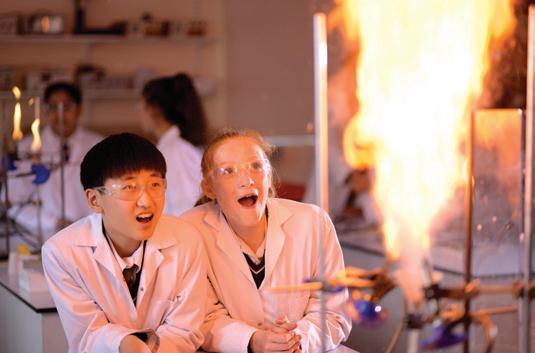
Box Hill School students gain strong academic results, with grades well above national averages. A Level and IB students achieve places at highly regarded universities, many in the Russell group of institutions such as Cardiff University, the University of Exeter, the University of Nottingham, UCL and many more, including in international institutes.

To help prepare students for these next steps, dedicated careers advice along with university visits and other tailored activities helps to guide them through the process of making higher education choices.
At Box Hill School, students have a large, happy ‘home away from home’ boarding environment to encourage them. Here students thrive while under the supervision of dedicated house parents and personal tutors.
Excellent pastoral care ensures every student here feels seen, valued and cared for. This starts from the very first day.
One example is Anne, a Swiss-French national who said teachers were “extremely supportive,” which gave her the confidence to push herself, both academically and socially. So much so, that she successfully applied for and was successful in being selected for the prestigious role of Deputy Head Girl. Asked to list the top three skills she’s gained here, she says, “Resilience, self-awareness and overcoming my fears.”
Box Hill School’s campus is nestled in idyllic, picturesque countryside, with good transport links, local amenities and close proximity to airports and London.
“Box Hill School was the most amazing time of my life.”
MAX, ALUMNI 2023


The internet’s impact on education has lagged behind breakthroughs witnessed in other sectors. Communications, commerce, technology — each has been irreversibly disrupted. And whilst the internet has transformed the way people connect and communicate globally, that impact has fallen short of education.
Yet the internet has the unique power of bringing together students from around the world. We can break down geographical barriers, engage in meaningful cross-cultural interactions, and develop a global perspective that enriches their educational experience.
These communities of global, connected, motivated students are precisely what we at CATALYST by Winchester College are creating. We work with global cohorts (ages 10-18) to cultivate leadership skills and delve into their passions. Through interactive online workshops, projects, and meticulously curated activities, students are primed for the challenges and opportunities they will encounter in university and beyond.

Rather than simply teaching students about leadership or innovation, we provide opportunities for students to put their skills into practice. By tackling real-world challenges, such as climate change and the ethics of AI, students develop their skills in a meaningful and impactful way. They also gain a more nuanced understanding of these global issues, which are often viewed differently depending on one’s background and experiences.
Our students develop a unique toolkit of skills that are essential for success in the 21st century. They learn how to communicate effectively across different cultures, collaborate on projects — remotely —, and develop a global mindset.
Moreover, through group projects and team-building exercises, students work together and support one another, fostering a sense of camaraderie and shared purpose. Our cohorts build a strong sense of community and belonging, despite being physically separated — students can develop strong bonds and friendships that transcend geographical boundaries.
This is only possible by leveraging connectivity and advanced digital technologies. Our students are able to learn and grow outside of the traditional classroom setting, with a wealth of resources and activities that students can access from anywhere with internet connection. In short, our programmes are so successful precisely because they are online, not in spite of it.
“A life-changing opportunity that can connect you to other fellows across the globe to learn about several interrelated topics and build a robust network.”
YOUSSEF, CATALYST STUDENT, EGYPT
“A family friend recommended the school to me,” starts Maksym, who has been a boarder for three years. “It was a scary thought moving overseas from my family but as soon as I arrived, I made a friend from Cuba, and all the staff really helped me.”
“I didn’t really know what to expect living away from home, but I have settled in and I have been so happy here at St Leonards.”

Maksym’s initial stay was for three months, and three years on, he’s still able to call St Rule his home away from home.
“English is not something that I was able to study to such a high level in Ukraine. Now I can go all around the world and I can help my family with the language,” says Maksym.
“There are subjects I would not have been able to study, like Drama. I really enjoy studying it, learning about things like improvisation and playing different roles.”
Maksym has embraced the opportunities, both curricular and co-curricular, and his interests are certainly wide ranging.
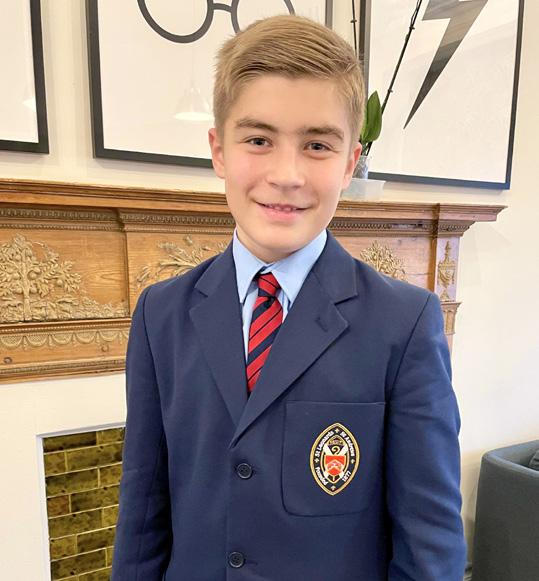
“The teachers are really kind and supportive. I really enjoy the opportunities outside lesson time - I do rifle shooting club, dance and rugby after school.”
Living so far from home, in particular with the situation in Ukraine, has not been easy. “It can be hard to contact my parents back home in Kyiv as there is sometimes no electricity there, but the boarding staff do everything to help me call home whenever I can,” says Maksym.
Looking ahead, the 13-year-old is already making plans for the future. “I plan to stay here in the UK for university,” he says. “It’s too early to know what I want to study though!”
His friends back home, he tells us, think living and learning abroad is “cool”. “Not everybody has the choice to come to a boarding school in the UK. Everybody is really friendly and it’s important to have fun.”

Maksym,13, from Kyiv, Ukraine, shares his experiences of studying at St Leonards School in St Andrews (Year 9), and tells us what inspired him to choose a boarding education in Scotland.


One hallmark of a Bloxham education is the gold standard of pastoral care we provide to all children who come through our doors. Never is this standard higher in our priorities than with international students. We appreciate the challenge of living far from home, so on arriving at Bloxham, overseas pupils are enfolded within a nurturing support system in their boarding houses and in the wider community. Every child is known individually, and our care is tailored to meet their needs. Within our vertical boarding structure, international students are fully integrated with students from the UK, meaning all learn and develop together.
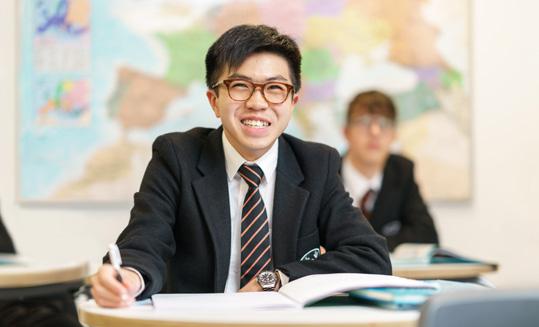
Ben (Lower Sixth) lives in Hong Kong with his family when he’s not boarding with us. He shared, “when I came to Bloxham, there was a ‘culture shock’ as to how every aspect of a pupil is treasured and able to flourish. The school community is very wholesome and generally inclusive of everyone.” Ben has loved his time boarding: “the tight-knit community around each boarding house is cultivated by a strong leadership team of Housemasters and Housemistresses. My Housemaster has been incredibly helpful in my journey. I had never been to a boarding school before, let alone one thousands of miles from home, and I am very grateful for his support during some difficult times.”
Ben hopes to study History at Oxford after leaving school. He will be the first in his family to attend university, so wherever he goes will represent an immense achievement.
“You can boil a good education down to the aim of producing happy and successful adults. Success is often easy to see, but comes in all shapes and sizes. Happiness, or a contentment with oneself, is more complex and is achieved over time, through consistency, a fair share of success and failure and the forming of lifelong friendships. At Bloxham, the emphasis is on both; we know you cannot have one without the other. This is why our commitment to an excellent holistic education remains as passionate today as it was 160 years ago.”
MATT BULL, DEPUTY HEADBloxham School is a co-educational boarding and day school nestled in a beautiful Oxfordshire village. We provide a holistic education where every child is known and valued.
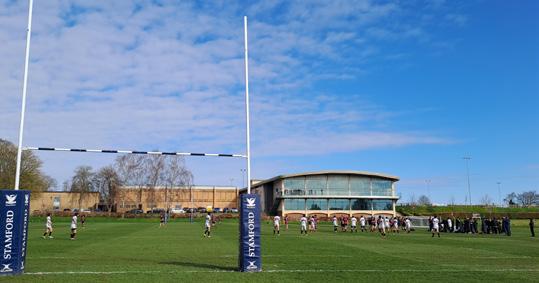
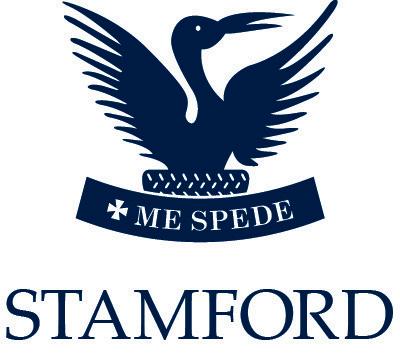
In March this year, Stamford Schools welcomed visitors from Waseda Jitsugyo High School in Tokyo. The visit was to celebrate the School’s continuing relationship with the international school who send two students per year to study Sixth Form at Stamford.
In February 2022, a Sakura Cherry Tree was planted by inaugural students Lisa and Nanako, from Waseda Jitsugyo High School, Tokyo with Principal Will Phelan. In March 2023, Waseda visited Stamford Schools for the first time, and we celebrated their visit to the UK by unveiling a plaque with the Interim Head of Stamford School, Nick Davies, and Kazuhiro Hishiyama, Head of International Affairs from Waseda Jitsugyo Schools.
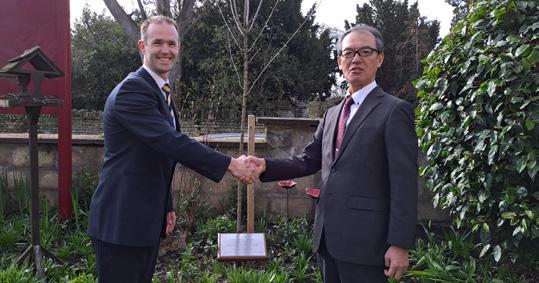
The plaque reads “Your blossoms are a chain of friendship between England and Japan” by Collingwood “Cherry” Ingram. Waseda’s visit was also celebrated with two rugby games against Stamford School with their Under 16s and Under 18s teams. Our students from Waseda this year are Reina and Rio. They will be taking part in our Junior School’s Japanese day in June, giving younger pupils an insight into life and culture in Japan.
Pupils will enjoy an introduction to martial arts, will take part in a O Hanami festival, Otsukimi (the Moon viewing festival), Anime sketching, Kimono designing and Haiku poems. We very much hope Reina and Rio will enjoy these celebrations with the Stamford Junior School children.
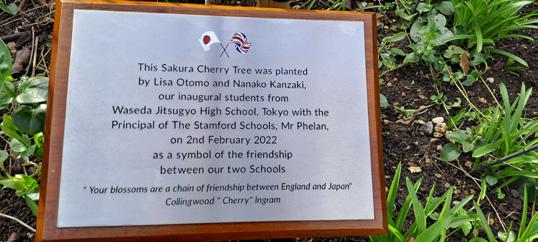
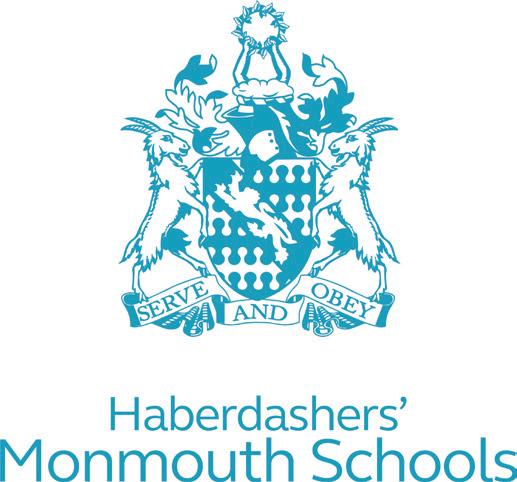 Mr Alex
Mr Alex
September 2024 will mark the beginning of a new chapter in our 409-year-old institution’s history, as our girls’ and boys’ senior schools will merge to become fully co-educational. Boarding and day pupils will benefit enormously from the multi-million-pound investment into the redevelopment of the sites, including a new Sixth Form Centre, dance studio and dining hall.
We have more than 250 boarders from Year 3 to 13 who reside in one of six distinct boarding houses, each with its own character and house team. Our junior boarding house, already co-ed, feeds into three single-sex middle houses, before pupils move into one of our purpose-built, single-sex, Sixth Form Houses. Each offers ensuite study rooms providing a pre-university experience and increased independence in a controlled environment.
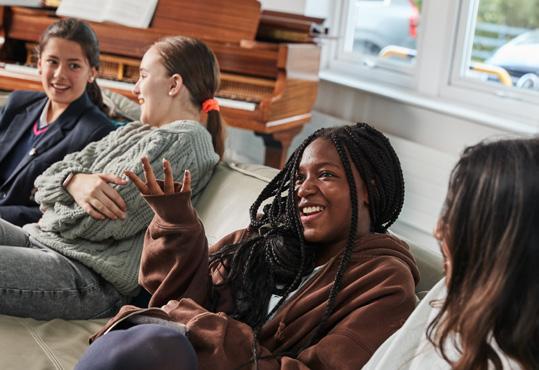

With our two senior schools merging, our boarders benefit from so many superb facilities: two swimming pools, two gyms and two Astro pitches, tennis courts, a rowing club (we are located next to the River Wye); all which support our extensive co-curricular activity programme. We are also a short walk from the very appealing market town high street.
Weekends and evenings are structured and packed with fun activities balanced with supervised homework periods. Most boarders stay in school at weekends and can participate in activities including go-karting, water parks, paintballing, and cinema trips.
We have introduced some optional weekends away, in place of exeats, so boarders can enjoy cultural, fun trips, with visits to museums, theatres or outdoor activity centres. This year’s programme included London and Cardiff and next year we have added the Isle of Wight and Bristol.
We also have a dedicated transport department. Parents supply us with flight details, and we do the rest! We offer supervised, door-to-door coach transfers every holiday along with a minibus shuttle to our local train station. We often take more than 100 pupils to Heathrow Airport at the end of term. We are extremely proud of our nurturing environment where students thrive academically, socially, and personally. We look forward to embracing our exciting transition to co-education in September 2024.
I remember arriving at The Oratory School in 1995, fresh from a flight all the way from Hong Kong. I came to The Oratory without knowing much about the United Kingdom as this was obviously before social media and the internet. It was a culture shock, but in an exciting way! I had always known I wanted to study abroad, and very much relished this opportunity.
I spent my first year trying to adjust, learn a new language, and getting used to being a boarder. One of my first memories was being amazed that we had sports activities every day, as when I was in Hong Kong, we would only do sports twice a week. I discovered rugby and cricket and became the Captain of Badminton.
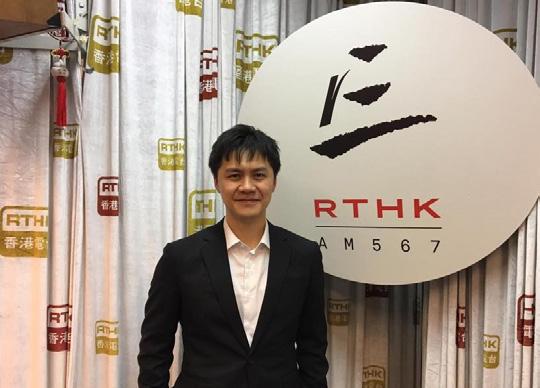
I was determined from a young age to study science. I never expected that The Oratory would expose me to so many different subjects and that I would find joy in them. I was delighted to receive a chemistry award during my studies. Art was another subject which I found myself excelling at, all thanks to the quality of teaching.
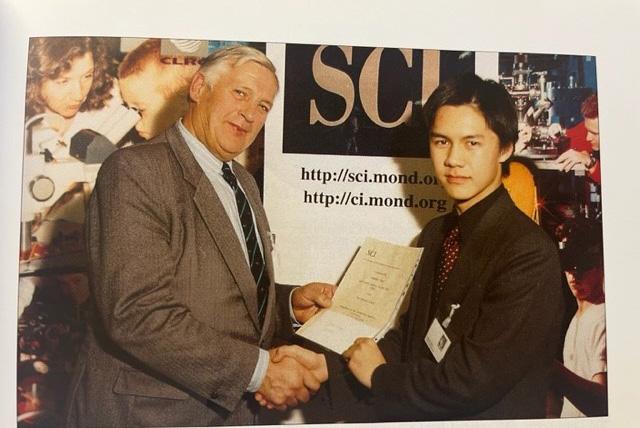
The Oratory School taught me discipline, a strong work ethic and an opportunity to master science subjects in the English language. This enabled me to return to Hong Kong and join Medical School with a strong upper hand. Conversing medically using the English language was a huge advantage in my early career and has led me to my current role as an Ophthalmologist, with a host of awards including a CP Fong Gold Medal in Medicine, H.C. Liu Prizes in Anatomy and numerous scholarships.
I still miss some things from The Oratory: my teachers, my friends, the beautiful grounds and I catch up with a few Old Oratorians who are based in Hong Kong with great fondness. I am also still close to my FitzAlan House Master Dr Andrew Nash, who I worked particularly closely with during my final year as Vice-Captain of the House. I visit him every time I come to the United Kingdom.

Old Oratorian Dr Poemen PM Chan (OS 1995-2000) reflects on how his Oratorian Education has helped him in a positive way.

Concord College’s international community came together to raise money in the wake of earthquakes in Turkey and Syria.

Following the devastating earthquakes across Turkey and Syria earlier this year, students from Concord College joined together to raise over £1500 to help those affected.
As an international community, which includes students from Turkey, the College’s students were keen to do something to help.
Ceylin, a Year 11 student, said, “When I heard the news of the earthquake back home, I knew I had to do something to help the devastation in my country”. The idea to fundraise began with a donation box in the College and an online fundraiser. “We then started making and selling chocolate for Valentine’s Day. Lots of the boarding house girls came together to help the cause, raising over 200 pounds with the help of some teachers also”, Ceylin explained.
The idea of fundraising spread quickly, inspiring Sixth Form student, Bulut, who is also from Turkey, to hold a bake sale.
“We wanted to make this donation as big as possible, so we thought of holding a bake sale in College which would help us raise awareness as well as a greater sum of money for the cause”, he said.

With help from lots of friends and the College’s Outreach team, the bake sale was arranged and subsequently a great success!
“After intensive selling throughout break times, we were able to raise over £1000 from the bake sale! This was all thanks to members of staff and students who turned up to buy treats, especially the outstanding number of people who were willing to extend their donation beyond the price of treats they bought”.
Staff and students enjoyed not only the amazing baking, but also the opportunity to come together in aid of such an important cause.
The funds raised have been donated to the Oxfam Turkey-Syria Earthquake Appeal.
COURSE OBJECTIVES: “To heighten the awareness of students of the threat posed by criminals on the streets and on public transport and the measures available to counter that threat”.
All students should have a basic level of understanding of Personal Safety & Situational Awareness as duty of care starts at the home so students can get to school or place of study safely.
Not Just an education facility: Our ethos here at Hawkesandco is that schools/colleges & universities and not just clients, but they become part of our family with that personal touch sadly missing in today's world. We also work within schools' budgets for cost effective training solutions.
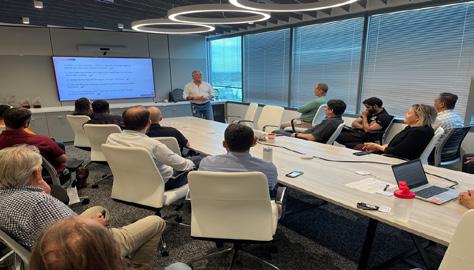
Note: Hawkesandco is a unique father (ex-SAS) and daughter training team from Herefordshire. Having 4 children I am fully aware of the risk our youngsters now face so would like to pass on my experience in keeping safe in some of the most dangerous places on the planet .
LEARNING OUTCOMES: Students will, after the session:
§ Gain self-awareness
§ Build Self-confidence
§ Know their options
§ Learn new skills
§ Calculate potential dangers
§ Adopt sensible precautions
§ Understand how to breakaway
Personal Safety & Situational Awareness Training is a 40 mins theory class followed by 40 mins practical scenarios to ensure lessons are learned. This is not self defense but using you mind to keep out of harms way.

www.Hawkesandco.uk

Mick Hawkes QCB MSc: Mick Spent 24 Years in the Military including 14 years in the Special Air Service. After 22 years in corporate security with 15 years as head of security for SBM offshore worldwide he achieved a record of not having a single security incident recorded against the company in all those 15 years.
Last May, Mick decided to come back to the UK and write a book (Life on the edge) as well as set up a family security training company alongside his daughter Keely.


Keely Hawkes is Micks youngest child as he also has 3 serving sons in the military:

Keely was born and raised in Hereford in a military environment alongside he three older brothers. She walked up Ben Nevis at the age of 7. Keely went through this training at the age of 11 and is proof that the training really does work.
Keely is trained in Conflict Management and demonstrates to the students all the breakaway techniques so that the students see that you don’t have to be a big strong individual to keep yourself out of the hands of criminals
In an average school of 250 children, they will receive unwanted, inappropriate, or malicious incoming traffic to their devices some 17,300,000 times in a year. That’s more than 150 every day to every child. It is a staggering figure that explains why we hear about so many safeguarding issues that have a digital influence.
Neil BuirskiDirector & Founder, SchoolsMobile.com
For more information – | neil@schoolsmobile.com | 0333 242 3168

Every school has detailed policies about the safeguarding and protection of their children. To parents and guardians this can sometimes be compared to the small print of the terms and conditions that companies set out and ask you to read before place an order online. (Have you ever tried to wade through them before clicking to place an order?)
Suffice to say they are rarely read by most parents — until, of course, something goes wrong. Then it is a different story.
Children under guardianship are potentially more vulnerable as a result of the proliferation of 3/4/5G devices. With proper engagement between you and the parents, however, there is a simple solution that blocks those millions of incoming traffic, continuously, both in and out of school as necessary, and treats all children equally and fairly.
To understand the vulnerability, we have produced a simple graphic that illustrates how what you may have thought is secure can still allow the unwanted material to get through your protective wall.
to set up — and then children can continue with their normal schedule and let parents overseas breathe a sigh of relief that there is one less of modern life’s problems to worry about.
We have mentioned the 90 seconds. Better still, it only costs about the same as one cup of coffee a month.
We are fully aware of the constraints on our time, it’s a busy world, but the severe impact of breaches of e-safety will not stop without the active engagement of your parents who have entrusted the safety of their children to you.
We hear from Designated Safeguarding Leads that 95%+ of all issues that have to be dealt with in school originate outside of school or on devices where the school currently has no influence. Schools are under increased pressure from government to take responsibility for personal devices and follow the guidelines detailed in KCSIE (Sept ’22) and Behaviour in School.
Until now there has been no easy or practical way to make a real impact. SchoolsMobile, however, believes it has created the most effective, flexible, and simple solution. It is easily affordable and can be customised to meet the needs of individual schools. We have proved that it works in the real and digital world.
If a child spends some 347,133,600 seconds in education over 11 years, surely it is worth investing just 90 in their safety and wellbeing.
Keeping children safe when they are in host family homes and overseas can be done but it is complex and sometimes limited by the connection type. Moving the needle when it comes to creating a safe and balanced digital world for children is not an IT problem – it’s a simplicity problem. If you don’t make it simple to do, then it will always be an uphill battle.
There is one system that is simple to understand and, once in place, works seamlessly on behalf of parents, and children. It does not require any expertise, technical knowledge, or resource. And it only takes 90 seconds
References:
1 Almost 99% of traffic between a child’s device and the internet is unsolicited, while background traffic is used for tracking and behavioural analysis. 5Rights Foundation.
2 Statutory guidance ‘Keeping Children Safe in Education” 2022. Department of Education.
3 32% of 8–11-year-olds have seen something ‘worrying or nasty’ online. 36% of 12–15-year-olds could not correctly identify a fake social media profile. Ofcom, UK regulator for communication services.
4 Most breaches of e-Safety occur outside of the school and school hours when children access 3G/4G/5G devices and private/public networks in the home and elsewhere. SchoolsMobile DSL research.
5 The average price of a takeaway cup of coffee was around £3.40 in 2022. FreshGround UK.
6 Only a third of parents know the age requirement for social media platforms. Ofcom.
7 90% of prep school children aged 8-12 have had content sent to their devices by companies associated with adult material and pornography. 5Rights Foundation.

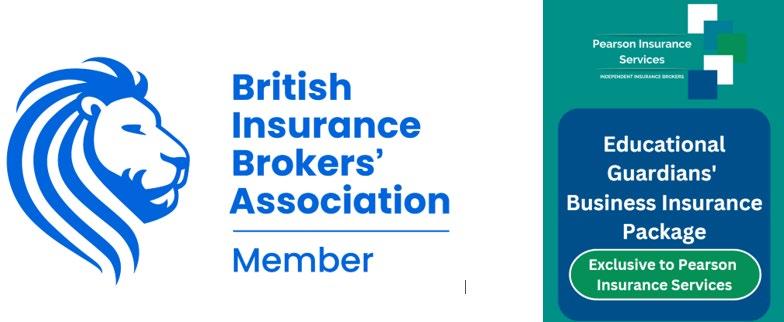








The views, thoughts and opinions expressed by our contributors and authors to this AEGIS newsletter solely belong to the contributors and authors, and do not necessarily reflect the views of AEGIS.

